
|
|
Train To The End of The World
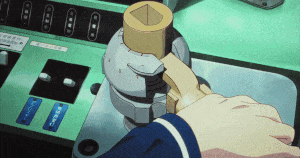 Just a small-town girl livin' in a fucked-up world; she drives the midnight train goin' god-knows-where. One of these days, I'm gonna browse the seasonal anime lineup and get really excited about one show in particular, singing its praises week to week, quoting it out of context, posting clips and gifs out the wazoo, and one of these days, it's going to be an anime that other people are actually watching as well. Train To The End of The World is a short but absolutely buck wild ride of an adventure series that frankly stole the show for me as my number one favorite show of the season, and that's a pretty bold statement considering some of the bangers it shared that season with. The plot is absolutely bonkers, the characters are charming and goofy, and the show moves a mile a minute, regularly going off the rails at every given opportunity as if Ozzy Osbourne himself was the conductor. At a meager 12 episodes, the show has no time to waste on extravagant Lore dumps or setting up a complex narrative structure, and moves at a breakneck pace with no hand-holding. This kind of show may be hard to follow for some, but for me, it's one delicious cup of tea.
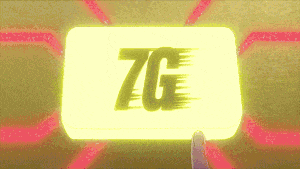 So THIS is what 5G conspiracy theorists were worried about... Everything starts when a local girl (Yoka) gets selected as the 77,777th customer at the unveiling of a new and highly experimental "7G" technology demo - supposedly advanced enough that it carries data at the speed of human thought, rivaling the power of god himself or whatever - and the event's eccentric host invites her to be the one to push the big fancy go-live button that launches the system into action. Confused and slightly terrified, Yoka obliges, and proceeds to send all of Japan (or so we must assume) into the future as the technology corrupts and collapses all of society into a freaky fever dream. And that's just the first two minutes of the show! Reality itself has broken down into a bizarre inversion of itself at all 30 train stops between Agano village and downtown Ikebukuro, warping the residents and environment of each area in some strange way or another. The real story begins when four young girls from Agano (now a village where everyone permanently transforms into an animal at some point in their 20s) decide life was already too short before 7G broke the world, and gear up to take a train all the way out to Ikebukuro to find Yoka - their friend, who left Agano some time ago - and see if she's okay. One girl in particular (Shizuru) is especially intent on finding her, for deeply personal reasons.
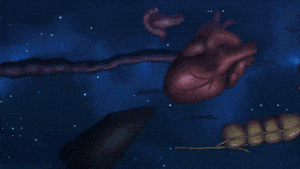 Suffice it to say, someone has some serious guts to spill. At the behest of a doddering old man named Zenjiro who seems to have lost most of his mental faculties* and can only speak in choo-choo noises ("bo bo bo" is the Japanese onomatopoeia used), Shizuru learns how to operate the local train and vows to drive it all the way to Ikebukuro, no matter how far out reality has stretched these two points on the map. Her friends - stylish gyaru Reimi, team mom Nadeshiko, gloomy bookworm Akira, and shiba inu team mascot Pochi - decide they aren't going to let her tackle such a monumental undertaking on her own, and the five of them set out together on what will surely be an epic journey to rejoin their lost friend. *Due to an utterly batshit wild side story related to the 7G launch, Zenjiro transforms into a younger (hotter) version of himself with complete mental lucidity once a day every day for a scant five minutes, and uses this time to communicate status updates and offer advice to the girls by hammering rapid-fire morse code messages on the rails of the train track back and forth, until the messages eventually and inevitably devolve back into "bo bo bo". Just thought I'd mention this in case you were worried that this show was going to be normal in any capacity whatsoever.
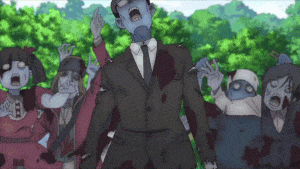 Is it even an adventure show if it doesn't tackle zombies at least once? Each episode centers around the girls trekking through mysterious and sometimes alien landscapes, pulling into each station along the way for supplies or information, and being tormented by each train stop's wacky new gimmick. Many stops have the entire village transformed into some weirdly specific entity, like goat-people who ram the side of the train, mandrakes who cackle and scream as they barrel past, or cartoon characters from a fictional anime. Because each stop is built on a different gimmick, the actual genre of the show varies from episode to episode, covering the usual assortment of action, thriller, horror, adventure, comedy, and parody that make up any good long-form adventure show. But the underlying core of the story centers on Shizuru, as she slowly opens up to her friends about why she's so determined to find Yoka again, in spite of the dangerous journey this bizarre new world presents them with. To put it simply, Yoka left for Ikebukuro shortly after a hurtful argument between the two of them, and with this apparent animal transformation curse looming over her shoulder, Shizuru can't stand the thought of losing what might be her last opportunity to apologize for what she said. Danger be damned, making amends is the only thing in the world that matters to her anymore. And like all other great bonds forged in the fires of girlfriendship, her friends are right there behind her to help make it happen.
 Okay, enough sappy sentimentality. Let's talk about the part where Shizuru and Reimi get crucified atop two tiny helicopter blades. In many ways, the show reminds me of David Lynch's 1999 movie "The Straight Story", in which an old disabled man makes a journey of 240 miles on a riding lawnmower just to visit his estranged brother after hearing that he'd suffered a stroke. Plot similarities aside, Train To The End of The World follows a similar approach by keeping the emotional core of its story extremely simple, forming a perfect contrast against the colorful and quirky misadventures surrounding it. It's for this very reason I would look forward to each new episode, to find out what outlandish new trials our heroes would face THIS time, knowing full well that each new encounter would bring Shizuru one step closer to reuniting with Yoka. The sheer poetry behind Shizuru deciding to name the train "The Apogee" (aside from it being a word Yoka taught her) blew my mind when she went on to explain it as such: "When the moon is at its farthest point away from earth, it can only get closer from there".
 No words I can type here could ever prepare you for what this image sounds like. Now, as with most things in life, it's not the destination that matters, but the journey. And although I spent the whole show rooting for Shizuru and Yoka to finally kiss and make up, the individual misadventures along the way were so fun that I wouldn't even have minded if the girls never actually reached their destination. In the same vein of the long-running adventure cartoons I grew up on, each episode tackled a common story premise from pop culture or classic literature - everything from Invasion of The Body Snatchers to Gulliver's Travels and back again - and I could easily see such a premise being stretched out into a fully-syndicated 52 episode Saturday morning cartoon staple. Then again, the production and animation team made incredible use of their limited time and budget, giving us a short but absolutely stacked 12 episodes, and I'm not mad about that in the slightest. The other reason this format worked so well for this show was that the cast all have such great chemistry together. This is evidenced not only by the fun and playful banter between the characters, but the simply excellent delivery by the voice cast. These kids really do sound like a close-knit group of friends, brimming with energy each in their own way, and they bounce off each other so effortlessly that the show doesn't even need to rely on the absurdity of its fever dream visuals to be funny.
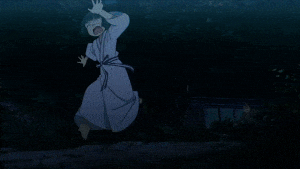 When sod gets moist with dewy flow, the fungus spores they start to show, and if you're sharp and in the know, you may spy a different being... If your own interest has been piqued by this point, I should give a bit of a disclaimer here. As I mentioned earlier, this show moves a mile a minute, and there's often so much happening at any given time that it might be overwhelming for viewers who struggle with auditory or visual processing. I watched the show with subtitles and I'm thankful that I've gotten really good at speed-reading, because I don't think I could have kept up otherwise. Characters tend to speak very quickly in this show, and the official subs on the Crunchyroll release occasionally had trouble keeping up when characters were talking over one another. It wasn't a deal-breaker, or even a very frequent occurrence, but I figured I'd mention it since it's something I see a lot of people online complain about.
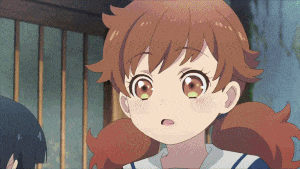 Shizuru's lightning-quick martial arts moves regularly come in handy when someone's ass needs saving. I hope she fulfills her dream of fighting an anteater some day. Likewise, if you're the type of person to complain about the ever-nebulous concept of "pacing issues", this show might be a bit iffy for you. I mentioned my disdain for even the concept of pacing issues in my review for Metallic Rouge earlier this year, but I'll paraphrase here as well. I assume when people mention a show having pacing issues, they're insinuating that certain story beats or specific scenes happen too suddenly, too quickly, too slowly, or too far apart for their taste, and that this should always be construed as a flaw for any show. I can't bring myself to agree, for two main reasons. One is that I feel like it's my job as a viewer to keep up with a series at the pace it plays out, regardless of whether or not it's the pace I expect the show to move at. The other is that unlike a movie - where you're intended to watch the whole thing in one sitting - a show or series is already broken up into convenient chunks for you to digest individually. There's no reason to worry that the pace of the story will disrupt its flow or meaning, because you are given a distinctive stopping point every 22 minutes to sit and ruminate on the events of each individual episode before moving on to the next one. I know that's hard for modern viewers, since we live in an era where marathoning through a series as quickly as possible is strongly encouraged, but I beg people to reconsider. My two cents here is that you'll find you complain a lot less about pacing issues if you take advantage of the episodic format by giving your brain a chance to sit with each one for a bit before moving on to the next!
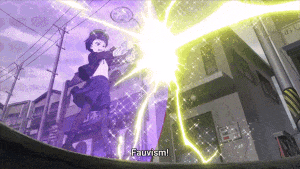 I don't care what anyone says, watching Akira fend off her enemies by shouting the names of random classical art styles is peak anime. Anyway, what was I saying? Following in the footsteps of my favorite long-running adventure serials, Train To The End of The World makes perfect use of the titular train as a vehicle (heh) for simply telling amusing small stories and sending its little blorbos on a haphazard variety of dangerous mini-quests in pursuit of a larger goal. It's a simple but extremely effective format that tickles the imagination center of my brain and encourages that sort of lovable weirdness that can only be captured in animation. It's also a great outlet for the type of wacky shenanigans that I miss seeing in a lot of modern shows. Sometimes I think modern showrunners are afraid to get too zany with their stories, like they're worried that too much of that cartoony comedy will get in the way of telling their singular emotional narrative, or that they'll have to justify it with additional Lore somehow to avoid "breaking immersion" or whatever. Train To The End of The World simply embraces its goofy imagination and stands strong as an example of why animation will always be my favorite medium.
 Growing up, parents used to say cartoons would rot my brain and that I should read books instead, but I like to think that cartoons are more like brain food for my imagination. Anyway, I'm gonna go eat a book now. I strongly recommend this show for fans of wacky modern fantasy and adventure shows in the vein of Adventure Time or Kipo & The Age of Wonderbeasts. If you want more shows like Train To The End of The World, I cannot stress enough how much you should check out Flip Flappers, as the colorful art style and overall imaginative storytelling between both shows are virtually identical. You might also enjoy the weird unreality of something like Otherside Picnic (unless you're a stickler or purist for the source material being better than the anime). And of course, if this show only piqued your interest because it's about trains - shoutout to Banba from Princess Jellyfish - you may also like The Galaxy Railways or Infinity Train, since aside from being train-related, both also revolve around their respective casts going on weird and often very imaginative adventures. 2024 has been a great year for original anime series so far, and this show right here is already a STRONG contender for my number one favorite. I can't wait to see what else is in store!
|
|